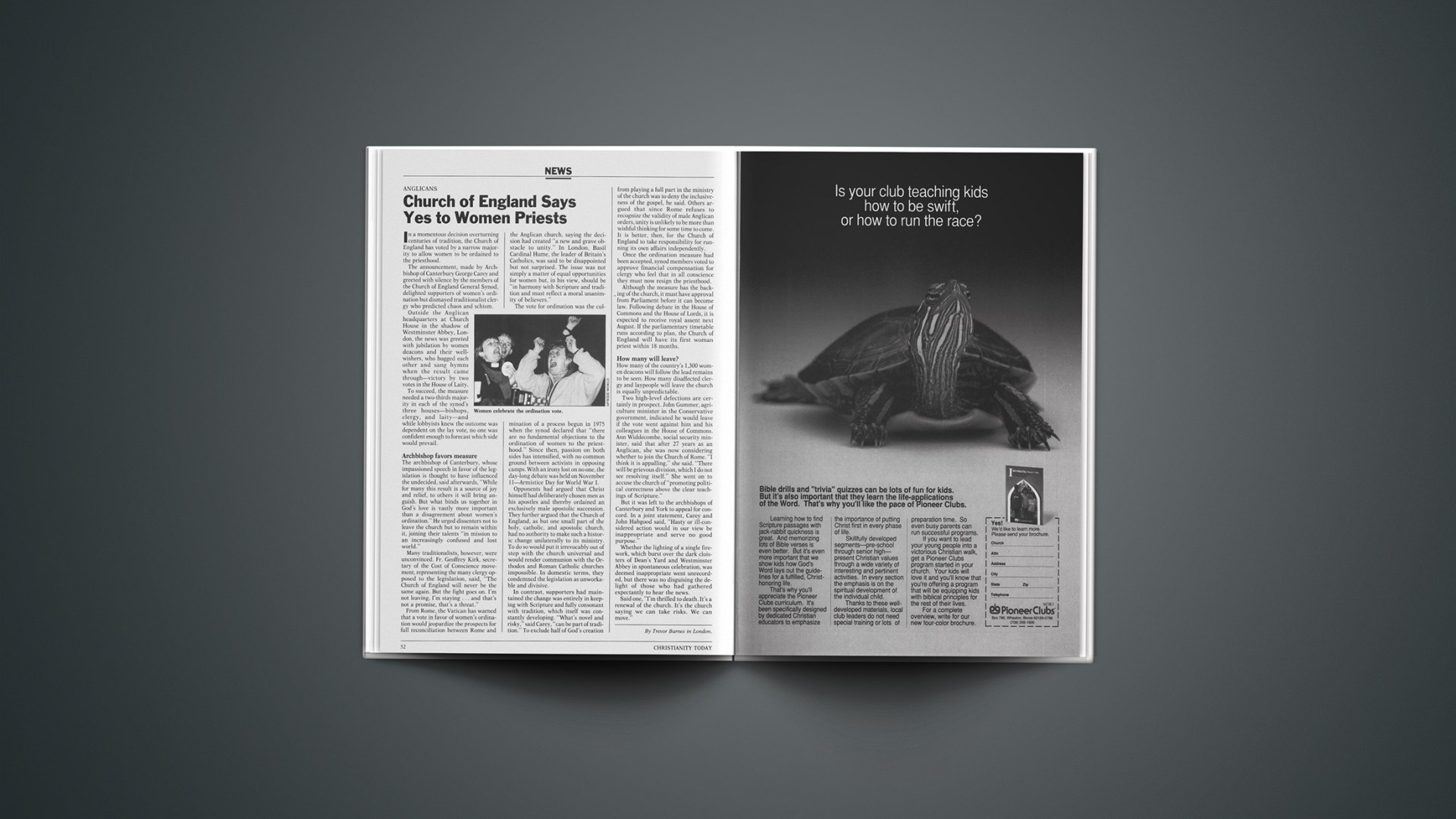In a momentous decision overturning centuries of tradition, the Church of England has voted by a narrow majority to allow women to be ordained to the priesthood.
The announcement, made by Archbishop of Canterbury George Carey and greeted with silence by the members of the Church of England General Synod, delighted supporters of women’s ordination but dismayed traditionalist clergy who predicted chaos and schism.
Outside the Anglican headquarters at Church House in the shadow of Westminster Abbey, London, the news was greeted with jubilation by women deacons and their well-wishers, who hugged each other and sang hymns when the result came through—victory by two votes in the House of Laity.
To succeed, the measure needed a two-thirds majority in each of the synod’s three houses—bishops, clergy, and laity—and while lobbyists knew the outcome was dependent on the lay vote, no one was confident enough to forecast which side would prevail.
Archbishop Favors Measure
The archbishop of Canterbury, whose impassioned speech in favor of the legislation is thought to have influenced the undecided, said afterwards, “While for many this result is a source of joy and relief, to others it will bring anguish. But what binds us together in God’s love is vastly more important than a disagreement about women’s ordination.” He urged dissenters not to leave the church but to remain within it, joining their talents “in mission to an increasingly confused and lost world.”
Many traditionalists, however, were unconvinced. Fr. Geoffrey Kirk, secretary of the Cost of Conscience movement, representing the many clergy opposed to the legislation, said, “The Church of England will never be the same again. But the fight goes on. I’m not leaving, I’m staying … and that’s not a promise, that’s a threat.”
From Rome, the Vatican has warned that a vote in favor of women’s ordination would jeopardize the prospects for full reconciliation between Rome and the Anglican church, saying the decision had created “a new and grave obstacle to unity.” In London, Basil Cardinal Hume, the leader of Britain’s Catholics, was said to be disappointed but not surprised. The issue was not simply a matter of equal opportunities for women but, in his view, should be “in harmony with Scripture and tradition and must reflect a moral unanimity of believers.”
The vote for ordination was the culmination of a process begun in 1975 when the synod declared that “there are no fundamental objections to the ordination of women to the priesthood.” Since then, passion on both sides has intensified, with no common ground between activists in opposing camps. With an irony lost on no one, the day-long debate was held on November 11—Armistice Day for World War I.
Opponents had argued that Christ himself had deliberately chosen men as his apostles and thereby ordained an exclusively male apostolic succession. They further argued that the Church of England, as but one small part of the holy, catholic, and apostolic church, had no authority to make such a historic change unilaterally to its ministry. To do so would put it irrevocably out of step with the church universal and would render communion with the Orthodox and Roman Catholic churches impossible. In domestic terms, they condemned the legislation as unworkable and divisive.
In contrast, supporters had maintained the change was entirely in keeping with Scripture and fully consonant with tradition, which itself was constantly developing. “What’s novel and risky,” said Carey, “can be part of tradition.” To exclude half of God’s creation from playing a full part in the ministry of the church was to deny the inclusiveness of the gospel, he said. Others argued that since Rome refuses to recognize the validity of male Anglican orders, unity is unlikely to be more than wishful thinking for some time to come. It is better, then, for the Church of England to take responsibility for running its own affairs independently.
Once the ordination measure had been accepted, synod members voted to approve financial compensation for clergy who feel that in all conscience they must now resign the priesthood.
Although the measure has the backing of the church, it must have approval from Parliament before it can become law. Following debate in the House of Commons and the House of Lords, it is expected to receive royal assent next August. If the parliamentary timetable runs according to plan, the Church of England will have its first woman priest within 18 months.
How Many Will Leave?
How many of the country’s 1,300 women deacons will follow the lead remains to be seen. How many disaffected clergy and laypeople will leave the church is equally unpredictable.
Two high-level defections are certainly in prospect. John Gummer, agriculture minister in the Conservative government, indicated he would leave if the vote went against him and his colleagues in the House of Commons. Ann Widdecombe, social security minister, said that after 27 years as an Anglican, she was now considering whether to join the Church of Rome. “I think it is appalling,” she said. “There will be grievous division, which I do not see resolving itself.” She went on to accuse the church of “promoting political correctness above the clear teachings of Scripture.”
But it was left to the archbishops of Canterbury and York to appeal for concord. In a joint statement, Carey and John Habgood said, “Hasty or ill-considered action would in our view be inappropriate and serve no good purpose.”
Whether the lighting of a single firework, which burst over the dark cloisters of Dean’s Yard and Westminster Abbey in spontaneous celebration, was deemed inappropriate went unrecorded, but there was no disguising the delight of those who had gathered expectantly to hear the news.
Said one, “I’m thrilled to death. It’s a renewal of the church. It’s the church saying we can take risks. We can move.”
By Trevor Barnes in London.










